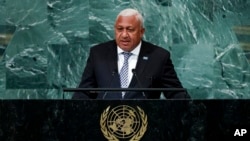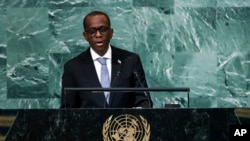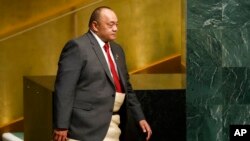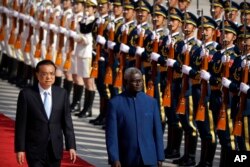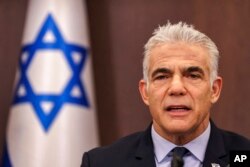At the U.N. General Assembly Friday, leaders from all corners of the world continued to call for an end to Russia’s war in Ukraine, and many condemned President Vladimir Putin’s threat of using nuclear weapons.
“Russia’s war of aggression on Ukraine – a scourge that reflects a brutal mentality of conquest and empire,” said Prime Minister Josaia Voreqe Bainimarama of the tiny island nation of Fiji. “No matter their might, no matter their size, Fiji is unafraid to condemn any warring nation.”
“We in the Pacific, who have lived the horror of nuclear fallout, wholly denounce Mr. Putin’s threatened use of nuclear weapons,” he added.
“What country who claims to be a liberator, threatens to annihilate the very civilians they claim to liberate?” asked New Zealand’s Prime Minister Jacinda Arden of Putin’s nuclear weapons threats. “This war is based on a lie.”
The prime minister of Saint Lucia, in the Caribbean, said the war in Ukraine has unleashed not just death and horrors, but has plunged the world into economic, food and fuel crises.
“The world could have been spared this humanitarian and economic agony, if once again countries and their leaders had respected and adhered to the principles of the Charter of the United Nations,” Philip Pierre said.
Russia will have its opportunity to address the international community Saturday, when Russian Foreign Minister Sergey Lavrov takes the podium.
At a meeting about the situation in Ukraine on Thursday in the U.N. Security Council, Lavrov did not address the military mobilization or Putin’s nuclear threats. Of the referenda that started Friday in occupied parts of Ukraine, he said they are the consequence of “Russo-phobic” statements by Ukrainian President Volodymyr Zelenskyy, who he said told people who feel they are Russian to go to Russia.
Climate threat
Several small island nations spoke of another war – against climate change.
“Climate change is an existential threat to people and our desire for international peace and security,” Tonga’s Prime Minister Hu’akavameiliku said.
He said it should be on the agenda of the U.N. Security Council – something that permanent member Russia vetoed last December.
“This threatens our territorial integrity, land, water, health, infrastructure, food security, biological diversity, livelihoods and ecosystems,” he said.
“This is a war we are losing in every community, city and country of every size,” Fiji’s Bainimarama said. “But small states, those least responsible, stand to lose the most of all. Yet we are not heard.”
Pakistan, which is recovering from catastrophic monsoon floods that have submerged a third of the country, warned of the impact of global warming.
“Life in Pakistan has changed forever,” said Prime Minister Muhammad Shehbaz Sharif.
“When global warming rips apart whole families and an entire country at this ferocious speed, it is time to ask why, and time to ask not what can be done, but what must be done,” he said.
Asian tensions
The prime minister of the Solomon Islands, whose country signed a security pact with China in May, complained of being “vilified” for it.
“This decision was reached through democratic processes by a democratically elected government,” Prime Minister Manasseh Sogavare said.
Relations between the Solomon Islands and the United States cooled after it signed the pact with Beijing and informed Washington in late August that it was imposing a moratorium on all naval ships passing through its ports. Washington has expressed concerns that China could deploy military forces to the islands.
Sogavare told the General Assembly that his country has a “friends to all and enemies to none” foreign policy and would not be “coerced” into choosing sides.
He urged all countries to be “sensitive and not inflame tensions” over the Taiwan Strait.
“Any miscalculation could threaten international peace and security and could have disastrous consequences on global trade,” he said.
The foreign ministers of the Indo-Pacific Quad – Japan, Australia, India and the United States – met on the sidelines of the General Assembly Friday. They said in a joint statement that they “strongly oppose any unilateral attempts to change the status quo” in the region.
Protracted conflict
The assembly also heard from Palestinian President Mahmoud Abbas. The 87-year-old leader spoke for nearly 50 minutes, venting his frustrations about his people’s difficulties with the Israelis and the decades of failure in achieving a two-state solution.
“Where can we build our independent state that will live in peace with its neighbors?” Abbas asked. “We want to live in peace with them! With Israel. Where will we establish our independent state to live in peace with them?”
He said contiguous Palestinian land to build that state on is disappearing as Israeli settlements grow.
Israel’s prime minister addressed the assembly the day before.
"Despite all the obstacles, still today a large majority of Israelis support the vision of this two-state solution. I am one of them," Yair Lapid said.
It is the first time since becoming prime minister that he has publicly endorsed a two-state solution.
His only condition, he said, is that there must be clear security guarantees for Israel.
"We have only one condition: that a future Palestinian state will be a peaceful one,” he said Thursday.
The General Assembly annual debate continues with Australia, China, Egypt and Ethiopia among the countries that will take the podium.




